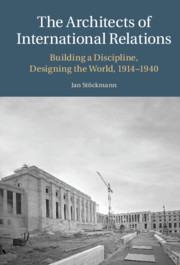'This meticulously researched revisionist account of the foundation of IR incorporates long neglected institutions and thinkers, including pioneering feminist thought. As Jan Stöckmann shows with dazzling intellectual flair and insight, the architects of international relations saw themselves not just as scholars creating a new way of looking at world politics, but as practitioners dedicated to making the world a better place.'
Joseph Maiolo - Professor of International History, King’s College London
'Galvanized by the First World War, for some twenty-five years a host of scholars, activists, and scholar-activists, women as well as men, reached across borders to build institutions, networks, journals, conferences and a whole new field - international relations - with which they sought to analyze and resolve the urgent problems of their time. By digging into out-of-the-way archives and recovering lesser-known voices, Stöckmann provides us with the most vivid and comprehensive portrait we have of this vibrant, cosmopolitan, and deeply fractured project.'
Susan Pedersen - Morris Professor of British History, Columbia University
'Interest in the history of the professional study of International Relations has grown apace in recent years and Stöckmann’s volume is one of the most comprehensive and scholarly to date. It provides further textual evidence of the intellectual diversity of its founding fathers - and importantly mothers - and substantial archival evidence of its institutional diversity, especially beyond the usual locales of Britain and America. The simplistic textbook account of the birth of IR surely cannot survive this invaluable work of analysis and synthesis?'
Peter Wilson - Associate Professor of International Relations, London School of Economics and Political Science
‘In this fascinating work of intellectual history, Stöckmann challenges the conventional origin story of the contemporary era in the study of international relations … The book illuminates a remarkably large and sprawling transnational cast of characters, including women and internationalist thinkers outside the Anglo-American world, who were mostly not idealists but pragmatic problem solvers.’
G. John Ikenberry
Source: Foreign Affairs
‘An important aspect of the text is its detailed description of the various actors involved in creating IR, ranging from state agencies to foundations and various nongovernmental groups; Stöckmann also notes the important contributions of women … Recommended.’
K. Buterbaugh
Source: Choice



